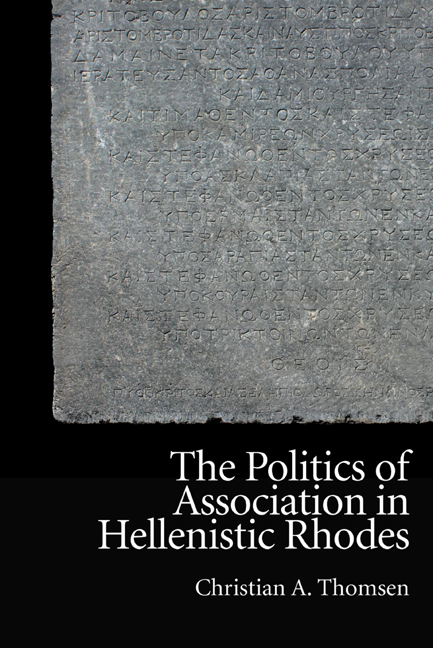Book contents
- Frontmatter
- Contents
- List of Tables and Figures
- Acknowledgements
- Abbreviations of Epigraphic Corpora
- Maps
- 1 Introduction
- 2 Rhodian Democracy
- 3 The Oikos
- 4 Public Associations
- 5 Private Associations
- 6 Private Associations and Human Resources
- 7 The Civic Aspirations of Private Associations
- 8 The Corporate Polis
- Bibliography
- Index Locorum
- General Index
1 - Introduction
Published online by Cambridge University Press: 08 October 2020
- Frontmatter
- Contents
- List of Tables and Figures
- Acknowledgements
- Abbreviations of Epigraphic Corpora
- Maps
- 1 Introduction
- 2 Rhodian Democracy
- 3 The Oikos
- 4 Public Associations
- 5 Private Associations
- 6 Private Associations and Human Resources
- 7 The Civic Aspirations of Private Associations
- 8 The Corporate Polis
- Bibliography
- Index Locorum
- General Index
Summary
Democracy is arguably among the most fascinating aspects of ancient Greek society. From its inception in the murky years of the late sixth century BCE, a democratic form of government became closely associated with Athens, the leading state of Classical Greece, and eventually spread to practically all corners of the Greek world, becoming, in turn, synonymous with legitimate government of the Greek polis. It is scarcely possible to overstate the prominence of Classical Athens in the study of ancient democracy. For the Classical period this is first and foremost a reflection of the state of our source material. In addition to a thoroughly Athenocentric literature comprising histories and court, council and assembly speeches – even a political pamphlet and a political treatise on the subject – hundreds of inscribed documents have allowed historians to examine political institutions and practice in ever greater detail. By comparison the evidence from Classical democracies outside Athens is as scarce as it is fragmented.
In terms of evidence, the playing field becomes somewhat more level when moving into the Hellenistic period. This first of all reflects the drastically diminished availability of literary evidence. Nothing comparable to the extant speeches or philosophical treatises have survived from the Hellenistic period, and even the histories that have do not allow a sustained view of any polis comparable to that provided by Herodotus, Thucydides and Xenophon for Classical Athens. On the positive side, however, the widespread of the so-called epigraphic habit across the Hellenistic poleis affords us a direct and in some cases sustained – but of course by no means complete – view of several more ancient democracies. So many, in fact, that historians can confidently say that in the course of the early Hellenistic period democracy had come to be regarded as not only the default, but also the only acceptable, form of political organisation. In terms of quantity, at least, there should be wide agreement that the heyday of ancient Greek democracy came in the centuries after the end of the Classical period.
DEMOCRACY, CLASSICAL AND HELLENISTIC
For these reasons, the Greek democracies of the Hellenistic period ought to provide fertile empirical ground for expanding our understanding of ancient democracy;
- Type
- Chapter
- Information
- The Politics of Association in Hellenistic Rhodes , pp. 1 - 17Publisher: Edinburgh University PressPrint publication year: 2020



